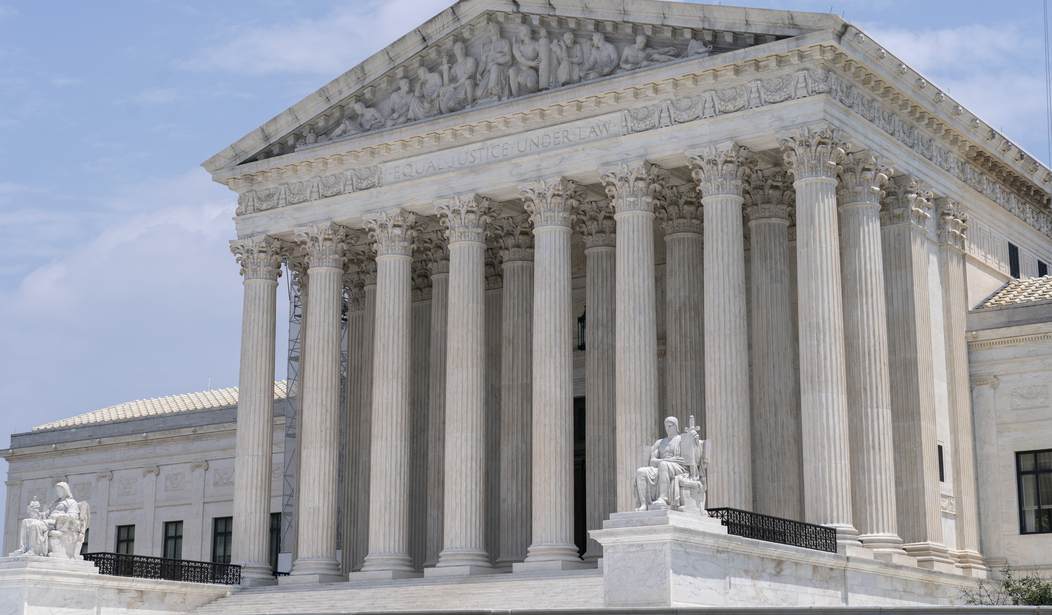As we roll into late June, the Supreme Court is picking up the pace as it hands down decisions. We started Thursday with 24 opinions outstanding — they issued four and look to be announcing more on Friday and next Wednesday (at least).
All four of these decisions were split, though the last was per curiam (not signed by a specific judge). The splits were not purely along partisan lines, however. I'll confess that crafting the "skinny" on each of these was challenging because the issues were narrow and somewhat esoteric.
June 20, 2024 Decisions
Date: June 20, 2024
Author: Thomas
Split: 6-3
Dissent: Gorsuch, Sotomayor, Kagan
Appeal From: Ninth Circuit
Basic Facts:
Petitioner Delilah Diaz was stopped at a port of entry on the United States-Mexico border. Border patrol officers searched the car that Diaz was driving and found more than 54 pounds of methamphetamine hidden in the vehicle. Diaz was charged with importing methamphetamine in violation of 21 U. S. C. §§952 and 960, charges that required the Government to prove that Diaz “knowingly” transported drugs. In her defense, Diaz claimed not to know that the drugs were hidden in the car. To rebut Diaz’s claim, the Government planned to call Homeland Security Investigations Special Agent Andrew Flood as an expert witness to testify that drug traffickers generally do not entrust large quantities of drugs to people who are unaware they are transporting them. Diaz objected in a pretrial motion under Federal Rule of Evidence 704(b), which provides that “[i]n a criminal case, an expert witness must not state an opinion about whether the defendant did or did not have a mental state or condition that constitutes an element of the crime charged or of a defense.” The court ruled that Agent Flood could not testify in absolute terms about whether all couriers knowingly transport drugs, but could testify that most couriers know they are transporting drugs. At trial, Agent Flood testified that most couriers know that they are transporting drugs. The jury found Diaz guilty, and Diaz appealed, challenging Agent Flood’s testimony under Rule 704(b). The Court of Appeals held that because Agent Flood did not explicitly opine that Diaz knowingly transported methamphetamine, his testimony did not violate Rule 704(b).
In a prosecution for drug trafficking-where an element of the offense is that the defendant knew she was carrying illegal drugs-does Rule 704(b) permit a governmental expert witness to testify that most couriers know they are carrying drugs and that drug-trafficking organizations do not entrust large quantities of drugs to unknowing transporters?
Holding: Affirmed.
Expert testimony that “most people” in a group have a particular mental state is not an opinion about “the defendant” and thus does not violate Rule 704(b).
Skinny: An expert can testify about the mental state of groups of people in general, just not the defendant specifically.
Chiaverini v. City of Napoleon
Date: June 20, 2024
Author: Kagan
Split: 6-3
Dissent: Thomas, Alito, Gorsuch
Appeal From: Sixth Circuit
Basic Facts:
This case involves a dispute between petitioner Jascha Chiaverini and police officers from Napoleon, Ohio. The officers charged Chiaverini, a jewelry store owner, with three crimes: receiving stolen property, a misdemeanor; dealing in precious metals without a license, also a misdemeanor; and money laundering, a felony. After obtaining a warrant, the police arrested Chiaverini and detained him for three days. But county prosecutors later dropped the case. Chiaverini, believing that his arrest and detention were unjustified, then sued the officers, alleging what is known as a Fourth Amendment malicious-prosecution claim under 42 U. S. C. §1983. To prevail on this claim, he had to show that the officers brought criminal charges against him without probable cause, leading to an unreasonable seizure of his person. The District Court, however, granted summary judgment to the officers, and the Court of Appeals for the Sixth Circuit affirmed. The Court of Appeals held that Chiaverini’s prosecution was supported by probable cause. In holding this, the court did not address whether the officers had probable cause to bring the money-laundering charge. In its view, there was clearly probable cause to charge Chiaverini with the two misdemeanors. And so long as one charge was supported by probable cause, it thought, a malicious-prosecution claim based on any other charge must fail.
Whether Fourth Amendment malicious prosecution claims are governed by the charge-specific rule, as the Second, Third, and Eleventh circuits hold, or by the "any-crime" rule, as the Sixth Circuit holds.
Holding: Vacated and remanded.
The presence of probable cause for one charge in a criminal proceeding does not categorically defeat a Fourth Amendment malicious prosecution claim relating to another, baseless charge. The parties, and the United States as amicus curiae, all agree with this conclusion, which follows from both the Fourth Amendment and traditional common-law practice.
Skinny: There must be probable cause to support a criminal charge to defeat a malicious prosecution claim on that charge. (That can't be side-stepped just because there may be probable cause to support a different charge.)
Date: June 20, 2024
Author: Kavanaugh
Split: 7-2
Dissent: Thomas, Gorsuch
Appeal From: Ninth Circuit
Basic Facts:
Congress generally taxes the income of American business entities in one of two ways. Some entities, such as S corporations and partnerships, are taxed on a pass-through basis, where the entity itself does not pay taxes. 26 U. S. C. §§1361–1362. Instead, the entity’s income is attributed to the shareholders or partners, who then pay taxes on that income even if the entity has not distributed any money or property to them. §§61(a)(12), 701, 1366(a)–(c). Other business entities do pay taxes directly on their income. Those entities’ shareholders ordinarily are not taxed on that income but are taxed when the entity distributes a dividend or when the shareholder sells shares.
Congress treats American-controlled foreign corporations as pass-through entities. Subpart F of the Internal Revenue Code attributes income of those business entities to American shareholders and taxes those shareholders on that income. §§951–952. Subpart F, however, applies only to a small portion of the foreign corporation’s income, mostly passive income. In 2017, Congress passed the Tax Cuts and Jobs Act. As relevant here, Congress imposed a one-time, backward-looking, pass-through tax on some American shareholders of American-controlled foreign corporations to address the trillions of dollars of undistributed income that had been accumulated by those foreign corporations over the years. Known as the Mandatory Repatriation Tax, the tax imposed a rate from 8 to 15.5 percent on the pro rata shares of American shareholders. §§965(a)(1), (c), (d).
In this case, petitioners Charles and Kathleen Moore invested in the American-controlled foreign corporation KisanKraft. From 2006 to 2017, KisanKraft generated a great deal of income but did not distribute that income to its American shareholders. At the end of the 2017 tax year, application of the new MRT resulted in a tax bill of $14,729 on the Moores’ pro rata share of KisanKraft’s accumulated income from 2006 to 2017. The Moores paid the tax and then sued for a refund, claiming, among other things, that the MRT violated the Direct Tax Clause of the Constitution because, in their view, the MRT was an unapportioned direct tax on their shares of KisanKraft stock. The District Court dismissed the suit, and the Ninth Circuit affirmed.
Whether the Sixteenth Amendment authorizes Congress to tax unrealized sums without apportionment among the states.
Holding: Affirmed.
The MRT—which attributes the realized and undistributed income of an American-controlled foreign corporation to the entity’s American shareholders, and then taxes the American shareholders on their portions of that income—does not exceed Congress’s constitutional authority.
Skinny: The government gets the dough.
Date: June 20, 2024
Author: Per Curiam
Split: 8-1
Dissent: Thomas
Appeal From: Fifth Circuit
Basic Facts:
In 2019, Sylvia Gonzalez ran for a seat on the city council of Castle Hills, a small town in southern Texas. While she was on the campaign trail, Gonzalez heard multiple complaints about the city manager, Ryan Rapelye. As city manager, Rapelye was responsible for, among other things, enforcing the city’s laws and managing its budget.
Gonzalez was elected in May 2019. Her first act in office was to help gather signatures for a petition seeking Rapelye’s removal. Eventually, over 300 residents signed the petition. The petition was introduced at the next city council meeting, where discussions grew heated after various residents rose to Rapelye’s defense and spoke against Gonzalez. The discussion over the petition continued the next day.
At the end of the second day, Gonzalez was packing up her belongings when the mayor, Edward Trevino, II, asked her for the petition. Gonzalez indicated that the petition was in Trevino’s possession, which he denied. He then asked Gonzalez to check her binder, where she found the petition. Gonzalez claims that she “did not intentionally put the petition in her binder,” and that she was “surprise[d]” to find it there.
Trevino brought this incident to the city police’s attention, and an investigation into these events soon began. Within a month, a private attorney tasked with leading the investigation concluded that Gonzalez had likely violated a Texas anti-tampering statute that, among other things, prohibits a person from intentionally “remov[ing] . . . a governmental record.”
On the private attorney’s request, a local Magistrate granted a warrant for Gonzalez’s arrest. When she heard the news, Gonzalez turned herself in and spent an evening in jail. The district attorney ultimately dismissed the charges. Gonzalez claims that this episode has convinced her to step away from political life.
Gonzalez brought suit under 42 U. S. C. §1983, in Federal District Court against Trevino along with the police chief and the private attorney in their individual capacities. Her complaint alleged that she was arrested in retaliation for her role in organizing the petition for Rapelye’s removal and that the defendants therefore violated her First Amendment rights.
To bolster her claim, Gonzalez alleged that she had reviewed the past decade’s misdemeanor and felony data for Bexar County (where Castle Hills is located) and that her review had found that the Texas anti-tampering statute had never been used in the county “to criminally charge someone for trying to steal a nonbinding or expressive document.” ECF Doc. 1, at 17. Gonzalez’s search turned up 215 felony indictments, and she characterized the typical indictment as involving “accusations of either using or making fake government identification documents.” Ibid. Other felony indictments included ones for fake checks, hiding murder evidence, or cheating on government exams. Every misdemeanor case, according to Gonzalez, involved “fake social security numbers, driver’s licenses, [or] green cards.” Ibid. Gonzalez pointed to this research as evidence that the defendants had engaged in a political vendetta by bringing a “sham charge” against her. Id., at 27.
The defendants moved to dismiss the complaint. They argued that the presence of probable cause defeated Gonzalez’s retaliatory-arrest claims against the individual defendants. The District Court denied the defendants’ motion. Although Gonzalez conceded that probable cause supported her arrest, the court allowed her claim to advance after finding that it fell within an exception to the no probable-cause rule that we recognized in Nieves. Gonzalez v. Castle Hills, 2021 WL 4046758, *5, n. 7 (WD Tex., Mar. 12, 2021).
The Fifth Circuit reversed that decision on appeal. The court thought that a plaintiff’s claim could fall within the Nieves exception only if the plaintiff proffered “comparative evidence” of “otherwise similarly situated individuals who engaged in the same criminal conduct but were not arrested.” 42 F. 4th 487, 493 (2022) (internal quotation marks omitted). Gonzalez’s claim failed because she did not provide such evidence.
- Whether the Nieves probable cause exception can be satisfied by objective evidence other than specific examples of arrests that never happened.
- Whether the Nieves probable cause rule is limited to individual claims against arresting officers for split-second arrests.
Holding: Vacated and remanded.
We recognized the Nieves exception to account for “circumstances where officers have probable cause to make arrests, but typically exercise their discretion not to do so.” 587 U. S., at 406. To fall within the exception, a plaintiff must produce evidence to prove that his arrest occurred in such circumstances. The only express limit we placed on the sort of evidence a plaintiff may present for that purpose is that it must be objective in order to avoid “the significant problems that would arise from reviewing police conduct under a purely subjective standard.” Id., at 407.
Here, Gonzalez provided that sort of evidence. She was charged with intentionally “remov[ing] . . . a governmental record.” Tex. Penal Code Ann. §37.10(a)(3). Gonzalez’s survey is a permissible type of evidence because the fact that no one has ever been arrested for engaging in a certain kind of conduct—especially when the criminal prohibition is longstanding and the conduct at issue is not novel—makes it more likely that an officer has declined to arrest someone for engaging in such conduct in the past.
Skinny: If no one has been arrested for similar conduct under a longstanding law, a claimant can sue for retaliatory arrest (even if there was probable cause for their arrest).
Note: Gonzalez and Chiaverini make a somewhat interesting side-by-side pairing. Bottom line: There has to be probable cause for a given charge, or else it's subject to a malicious prosecution claim. And if no one else has ever been arrested under the same provision for essentially the same conduct, it could still be subject to a malicious prosecution claim even if there was probable cause for the charge.
You can check out prior installments of The Skinny on SCOTUS series, here.















Join the conversation as a VIP Member